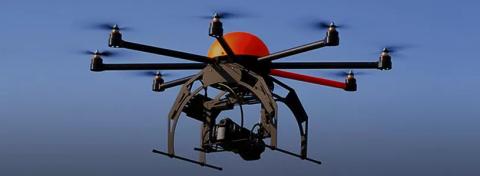
University of New Hampshire Unmanned Aircraft Systems (UAS) Guidelines
1.0 UAS Guideline Statement. The operation of UAS is regulated by the Federal Aviation Administration (FAA) and state law. UNH is establishing procedures to insure that the operation of UAS by UNH personnel or above UNH property complies with those regulations and is done in a manner that reduces risks to safety and privacy.
1.1 Scope
The procedures adopted pursuant to this policy apply,
1.1.1 To any UNH employee or student operating a UAS in any location as part of a UNH activity.
1.1.2 To any person operating a UAS above UNH property not as part of a school activity.
1.1.3 To the purchase of a UAS, or the contracting for any UAS services, with funding through a UNH unit.
1.2 Definitions
1.2.1 333 Exemption. An exemption from FAA general requirements available for commercial operation.
1.2.2 Commercial operation. Operation in furtherance of a business or incidental to a person’s business.
1.2.3 Public operation. Operation such as for national defense, intelligence missions, firefighting, search and rescue, law enforcement, research, biological or environmental l resource management.
1.2.4 Recreational operation. Operation for relaxation, hobbyor diversion, including as a component of a science, technology or aviation curricula or other coursework such as television or film production or the arts.
1.2.5 Section 107 operation. Commercial operation that meets the requirements of Sec. 107 of the FAA regulations, which require:
- Pilots with remote pilot airmen certificates.
- Weight less than 55 lbs., speed less than 100mph and altitude less than 400ft.,
- Daytime flight within the line of sight,
- No flights in covered structures or over people in the open, and UNH property. Buildings and grounds owned or leased by UNH.
1.2.6 UAS. Any unmanned aircraft systems subject to FAA regulation.
1.3 Procedures
1.3.1 Any UNH Employee or Student—UNH Activity
1.3.1.1 Commercial operation. In general any UNH employee or student seeking to operate a UAS as part of a UNH activity will be considered to be conducting commercial operations and must first obtain a 333 Exemption issued by the FAA. The UNH Police Department (PD) will process all applications for the foregoing.
If such employee or student is seeking to conduct a commercial operation that qualifies as a Sec. 107 operation, no 333 exemption is required. Any such employee or student must first obtain permission from the UNH Police Department, which must be provided with evidence of compliance with FAA requirements.
1.3.1.2 Recreational operation. A UNH student seeking to operate a UAS as part of course work may be considered to be conducting recreational operations. Such student need not obtain a 333 Exemption but must first obtain permission from the UNH PD.
1.3.1.3 Any UNH employee or student seeking to operate a UAS as part of a UNH activity must comply with the laws of the state in which the activity is to occur.
1.3.1.4 Any UNH employee or student seeking to purchase a UAS, or contract for UAS services, with UNH funds must first contact UNH PD for an assessment of UNH’s ability to comply with FAA requirements.
1.3.2 Any Person—Not A UNH Activity—Above UNH Property
1.3.2.1 Any person seeking to operate a UAS not as part of a UNH activity but above UNH property, for public, commercial (whether or not Sec 107 operation) or recreational operation, must first obtain permission from UNH PD, which must be provided with evidence of compliance with FAA regulations and New Hampshire laws.
1.3.2.2 In addition, any such person must limit the operation of the UAS to the following areas: Boulder Field, Kingman Farm, or Moore Fields.
1.3.3 Any Above-Described Person
1.3.3.1 No person operating a UAS capable of taking images shall take images in areas, or of information, in which there is a reasonable expectation of privacy.
1.3.3.2 No person shall use a UAS to conduct surveillance of any other person or group of persons.
1.4 Sanctions
Any violation of this policy or these procedures will be subject to legal or disciplinary action in accordance with UNH policies and procedures.
For further information regarding UAS visit the Federal Aviation Administration webpage.